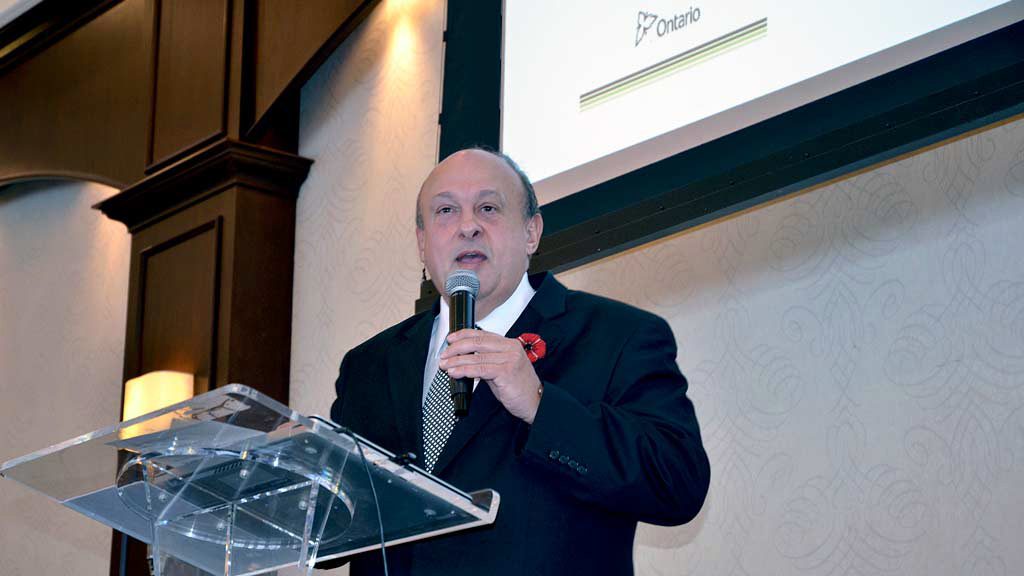The Residential Construction Council of Ontario (RESCON) recently held a mental health symposium to start the conversation on what to do about mental health in the construction industry.
“Right now, everybody knows mental health is a big issue and it’s an issue that’s not going away,” Andrew Pariser, vice-president at RESCON, told about 115 delegates at the event.
“We’ve all done a great job of recognizing it’s important and the question is now that we know its important what do we do? That’s the conversation we’re hoping to start today.”
Michael Tibollo, associate minister of mental health and addictions, was on-hand and said the stigma around mental illness and addictions needs to end and the government needs to do more to make sure the people that are suffering are able to talk about it and seek the help they need.
“We’re doing this by building a comprehensive and connected health system, both mental health and addictions that ensures that all Ontarians receive appropriate services and supports when and where they need them,” said Tibollo, adding he says without mental health you cannot have health.
“The system is in its infancy because it’s never really existed but we are looking to create access points that are readily available to everyone. People should have the best quality of service given to them when they need it… Capacity is my biggest hurdle right now because building capacity takes infrastructure and infrastructure costs money. We are looking at innovative ways of using existing structures, existing facilities to try to build that capacity as quickly as possible so we can start spending more money on education and prevention. We need to build resiliency because resiliency will eventually allow us to stop building capacity.”
About 500,000 people a week across Canada are not going to work because of a mental health or addiction issues, Tibollo said.
A challenge that we have as a great big province is that the psychological support is sporadic in rural and remote Ontario,
— Ron Kelusky
Ontario Chief Prevention Officer
“Think of how significant that is to all those who provide labour every day to come in and be able to do their jobs so you can fulfill your contract,” he noted.
“The people that are working in the construction industry need to know there is support for them and we need to work together. This opportunity to speak to you this morning is an invitation to all of you to help me develop the system that we are building and we are going to start implementing. We have started implementing it with the first investment of $174 million and we’ll continue investing in building a connected integrated system that has wraparound services for individuals in need of help.”
Ontario’s Chief Prevention Officer Ron Kelusky was also in attendance.
“I feel that prevention is the cheapest form of intervention,” he said. “By starting the discussion today you’re going to be able to eventually look at how can we start to reap the benefits downstream. Right now, everything is up stream. We are spending a lot of money to fix the problem as opposed to addressing the root cause.”
Kelusky said it’s important to create a safe work culture.
“We want to create not only healthy workers but also safe environments,” he said. “Construction is a high-pressure, competitive work environment. You guys are on a deadline when the ink hits the paper. There is a high expectation for your workers. There is a high prevalence of drug and alcohol abuse, layoffs, separation of family.”
“There are no quick fixes to this, it is a journey,” he added. “Creating a safe and non-threatening culture within your company can really help.”
In terms of tools that are available to the industry, the Infrastructure Health and Safety Association (IHSA) has partnered with Workplace Safety and Prevention Services (WSPS) and has started to develop specific tools and resources that are tailored to the construction industry, Kelusky told the crowd.
“It’s important in health and safety to talk the language of the industry or sector you are dealing with,” he said. “WSPS and IHSA are working with the Canadian Mental Health Association. There are tons of services available in the GTA and a challenge that we have as a great big province is that the psychological support is sporadic in rural and remote Ontario.”
There are alternative options out there, he said.
“We’re working with a company that takes the bricks and mortar requirement out of psychological intervention and puts it into instant access to psychological care,” said Kelusky. “If you have a problem you can phone and you can get immediate access. Large companies or associations can subscribe and its available to employees if they need it. It’s led by psychologists that said, ‘we’ve got to get out of the office more because people can’t come to the office like they used to.’ ”
Pariser pointed out that mental illnesses should be treated like physical injuries.
“Nobody knows what to do when you say you have a mental injury, but they do when you have a physical one,” he told the Daily Commercial News in an email after the event. “That’s why it was important for our industry to tackle this critical issue and facilitate a practical solutions-based discussion. Addressing the issue of stigma head on will empower symposium participants to carry on the conversation at their work sites.”
Follow Angela Gismondi on Twitter @DCN_Angela.











—-Michael Tibollo, associate minister of mental health and addictions, was on-hand and said the stigma around mental illness and addictions needs to end
That “stigma’ will remain so long as we continue to teach it. I see not a dent in our interest in teaching it.